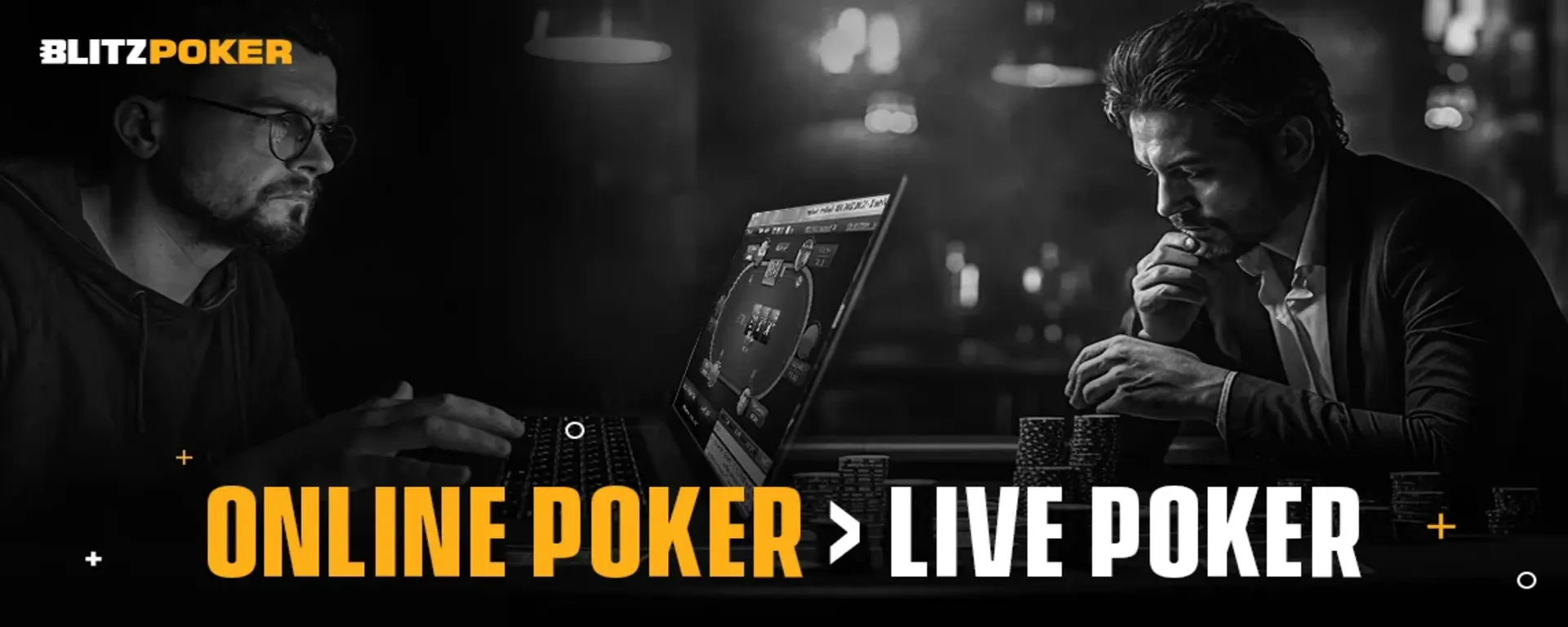Reasons Why Online Poker Is Better than Live Poker
In poker, whether you’re playing No-Limit Hold’em or any other version, the rules and strategies remain consistent, whether it’s in person or online. However, there are still notable variations you should be aware of. The poker game industry is growing a lot every year. Nowadays, many poker players prefer using user-friendly websites and mobile apps to play. This makes the trend of going to physical casinos for poker games decrease because the current technology is good enough to give online poker players an experience similar to traditional offline casinos.
Online Poker Offerings
Convenience: Online poker is incredibly convenient. You can access poker rooms from morning to night within minutes, faster than going to a physical casino.
Global Access: Play with thousands worldwide, offering various poker formats and blind levels, from low to high stakes.
Multi-Tabling: Online poker lets you join multiple tables simultaneously, giving control over the number of hands played per hour.
Speed: Online poker is much faster than live poker. In a casino, you might average about 20 poker hands per hour, while online, you can finish a tournament within a few hours.
No Commute: Skip the travel to a casino, waiting lists, cash exchanges, and sitting at a single table for extended periods, common in live poker.
Live Poker Offerings
Social Interaction: Playing live poker is a social experience. You’re in a public space, observing opponents, and being observed. Interactions with dealers, staff, and sometimes spectators happen. This can be excellent for networking but may tire introverts.
Optional Socializing: Being overly social isn’t mandatory in live poker. Some players prefer silence, while others enjoy sociable opponents for added fun.
Tipping: At a card room or casino, it’s customary to tip dealers and waitstaff, usually around $1 per drink or per pot won.
Reasons Why Online Poker Is Better than Live Poker
Online Poker Is More Competitive Than Live Poker
If you’ve already played high-stakes poker online, you probably already know it’s a tougher battleground compared to live poker. Online poker enthusiasts are serious players who’ve mastered strategies and are making fewer mistakes. Playing against them brings a surge of energy. On the flip side, live games are generally more relaxed.
Mastering high-stakes online poker means you can easily outplay live poker opponents.
The Speed Difference Between Online and Live Poker
When engaging in real-money online poker, the pace is notably quicker than live poker. Live poker restricts you to a single table, with about 30-40 hands played per hour. In contrast, online poker allows multitabling, doubling the hands played.
Live poker’s slower pace results from the physical aspects of the game, like card shuffling and chip handling. Players also take their time, observing opponents for potential bluffs. If you’re transitioning from online to live poker, the adjustment might feel frustrating initially, but it’s part of the live poker experience.
Poker Tells: Online vs. Live
Live poker involves reading opponents through facial expressions and body language. Observing these cues helps determine the quality of a hand or if someone is bluffing. Online poker eliminates the need to worry about physical tells, making it nearly nonexistent.
The Convenience Factor: Online Poker Wins
Opting for a live poker game requires dressing up, travelling, and finding a suitable table – not a feasible daily routine. Online poker offers the convenience of playing anywhere, anytime. Whether in sleepwear or by the pool, you avoid the hassle of getting dressed or commuting, allowing you to focus on strategic gameplay and winning substantial cash prizes.
Variety in Poker Games: Online Poker Excels
Online poker outshines live poker in terms of variety. Live poker often limits you to specific game variations like Texas Hold’em or No Limit Poker. Online, the options are limitless. Don’t fancy Texas Hold’em? Try Omaha. The beauty of online poker lies in the array of game choices, letting you play what suits your tastes and preferences.
There Are More Resources In Online Poker Than Live Poker
The online poker community is closely-knit, offering a plethora of guides, tips, tricks, and suggestions. If you’re new to poker, there’s ample support available online, creating a welcoming atmosphere. Live poker, on the other hand, lacks such widespread community assistance.
Online Poker Players Can Take Advantage of Tracking Software but Live Players Cannot
Unlike online players, live poker enthusiasts can’t utilize tracking software to enhance their game. Live players rely solely on playing to refine their skills, lacking the analytical tools available to online counterparts.
Online players, on the other hand, have the advantage of taking their improvement a step further. By recognizing their mistakes and understanding areas for enhancement, they can actively work on refining their poker-playing skills. Various tracking software suites cater to online poker players, facilitating the tracking and analysis of their games, thereby enabling necessary improvements.
Final Words
In our detailed guide, we can easily see that playing poker for real money online is quite different from playing it offline or in person. Whether you opt for online poker or the traditional live version, it’s important to grasp and accept these distinctions. For instance, if you prefer not having others around you while playing, then live poker may not be the best choice for you.
So now that you are convinced online poker is better than live poker, why not dive into the exciting world of online poker with BLITZPOKER where the thrill goes beyond traditional poker games, offering a dynamic and fast-paced environment that keeps you on the edge of your seat? The excitement goes beyond just playing a game; it’s also about the chance to win real money online. Feel the thrill as you explore Omaha, Texas Hold’em, and Open-Face Chinese (OFC) poker styles. Each one brings a different challenge and an opportunity to increase your bankroll.
